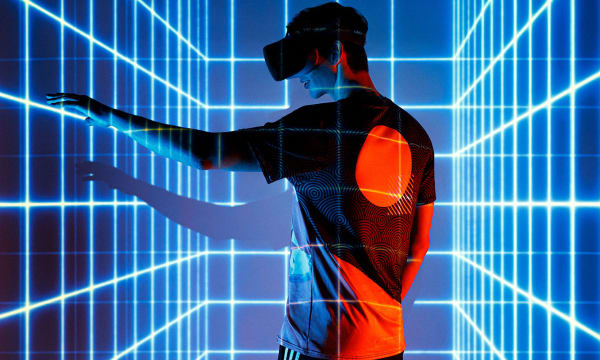Crypto-clubs and VIP NFTs in the metaverse are getting an upgrade as artists and creators stake their claim in decentralized platforms. New groups, media platforms and artistic directives are taking shape in Web3, giving creators more control over their work and space to collaborate in the digital realm.
Creator communities are gathering in Web3 in search of exposure and creative expression.

A members-only community in the metaverse, called The Row, is made up of architectural designs and NFT landmarks created by leading artists and digital creators. Launched in July, the space features work by creatives such as Misha Kahn, Andrés Reisinger, and Daniel Arsham, creative ambassador of The Row’s metaverse real estate development firm the Everyrealm. “The Row brings together visionary artists best known for their architectural landscapes and collectors seeking a unique, limited-edition residence that they can deploy across many different metaverses over time,” Everyrealm CEO Janine Yorio told Wallpaper.

Open-source Web3 creator economy DEIP unveiled its own Metaverse City in June: a collaborative and decentralized virtual space made by creatives, for creatives. Founded by a team made up of members from Arhead metaverse group, Balagan creative agency and architectural studio the Atrium, DEIP puts “creators at the center of the economic model, allowing them to skip out the middlemen and receive funding or sell their work through tokenization,” according to the platform. Metaverse City will host a range of art and work in film, science, publishing, music, sport, gaming and education while offering members validated digital ownership and individual monetization.
DRIP-LAB, an ongoing community of street artists and curators bringing the form to life in the digital world, just launched a new collection to merge physical and digital graffiti art in the metaverse. “THE WALL,” part of the DRIP-LAB project, is a phygital collection of street art created in the real world and re-created as NFTs hosted on the democratized platform Another-1. DRIP-LAB’s stated mission is “to breathe new life into the graffiti art scene, both on the street; and on the blockchain by leveraging the power of Web3 technology.”
Founded by former Tinder, Bumble, and Facebook leaders, Niche is a decentralized social media platform comprised of user-owned communities, where members can create, buy, and sell their own content. An ad-free platform, Niche’s co-founders Christopher Gulczynski, CEO, and Zaven Nahapetyan, CTO, tell Wunderman Thompson Intelligence that they’re reframing their platform to cater to creatives. “It opens up a lot of opportunities that don't exist with traditional, non-decentralized social media, because—by the nature of decentralization—it makes it really easy to buy, sell, and trade content. By having everything in an accessible protocol, you get this renaissance of creativity where all these other apps are built on top of it and come up with interesting applications with it that perhaps we're not thought of before.” Nahapetyan explains.
As consumers spend more time online, they are gravitating towards communities that reflect their IRL interests. Creators are tapping into platforms in which they can collaborate, share, create and work.
Main image design by Daniel Arsham, courtesy of The Row.
Please provide your contact information to continue.
Související obsah

Crypto clubs

